
7 Protein-Rich Vegetarian Breakfasts
You don't have to eat meat to build muscle, but you do need to get enough protein and essential vitamins and minerals. Here's your guide, in the form of a week's worth of well-rounded vegetarian breakfasts!
When you're a vegetarian who wants to eat sufficient protein to reach ambitious fitness goals, no meal presents as significant a challenge as breakfast. Sure, you can have eggs—if you're an ovo or ovo-lacto vegetarian—but after a few dozen omelets, you're likely going to be on the verge of a burnout. Other popular protein-packed breakfast foods—like steaming sausage plates, sides of bacon, and slabs of ham—are literally off the table.
Unfortunately, while a lack of protein might be the most glaring hurdle to mastering a well-rounded vegetarian diet, it's not the only essential nutrient you could be missing out on. A lack of animal-based foods means that omega-3 fatty acids, vitamin B-12, zinc, and iron are all harder to come by. It's no wonder that many vegetarians resort to piling on the carbs, followed shortly by a small mountain of supplement pills.
Don't give up on whole foods! Your meat-free life doesn't have to mean missed muscle gains and inadequate nutrition. These simple, nutrient-rich breakfast options can do wonders for your vegetarian diet, and they're all incredibly simple to make. Try one tomorrow and get ready to be surprised!
1. Banana Almond Cream Shake
If you're running late, looking for some quick pre-workout nutrition, or are simply in the mood for an early morning shake, this recipe is for you. It's high in protein, an essential building block of bone and muscle. Not surprisingly, vegetarians tend to consume less protein than carnivores—usually averaging 10-12 percent of their daily calories, compared to the recommended 10-35 percent.
But it's not just quantity that matters. When it comes to protein, quality—specifically absorption rates—are key. Plant-based proteins fall short in this area, with protein digestibility scores usually around 10-30 percent lower than for animal proteins.1 If you're a vegetarian, you should aim for 0.6-0.8 grams of protein per pound of body weight, but also mix your protein sources to improve quality.2
Packed with 32 grams of protein, this shake is a great way to get the ball rolling. Better yet, the combination of pea and rice protein offers an efficiency ratio that rivals egg and dairy. Add in some fruit and ice, and go on your way confident that you've started the day right.
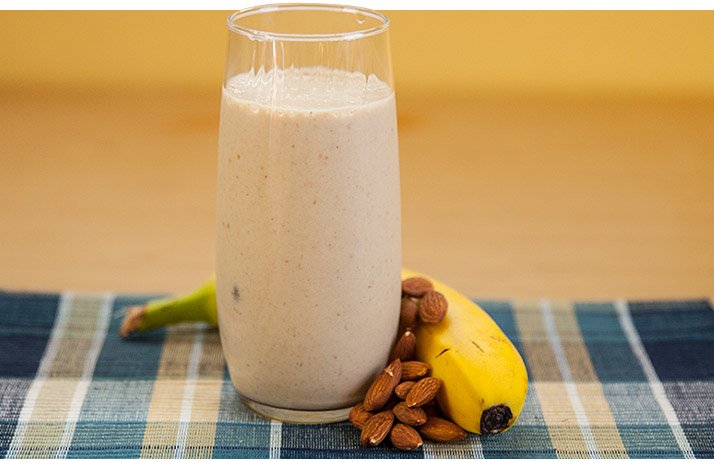
2. Homemade Seed Cereal
Omega-3 fatty acids are found in the highest quantities in fish, so it comes as no surprise that vegetarians tend to fall short on them.3 Not only are omega-3s required for the body to function, they're also full of health benefits including protection against heart disease, improved cholesterol, and reduced joint pain.
Studies show a high response rate to EPA and DHA supplementation in vegetarians—including an increase in red blood cells, which allows more nutrients and oxygen to be delivered to active muscle—so supplementation is a no-brainer.3,4 But that doesn't mean you need to stop there.
The good news for vegetarians: Essential fatty acids are found in seeds, too. The combination of chia, hemp, and buckwheat packs a whopping omega-3 punch. In fact, chia has the highest omega-3 levels of any known plant product. But aside from the nutrition, this particular seed combo makes for a great hearty breakfast cereal, works as a crunchy topping for your yogurt, and can add a bit of texture to your morning smoothie. Add dried fruit for that extra pop of sweet or tart, or add a few walnuts for an even greater healthy fat boost.
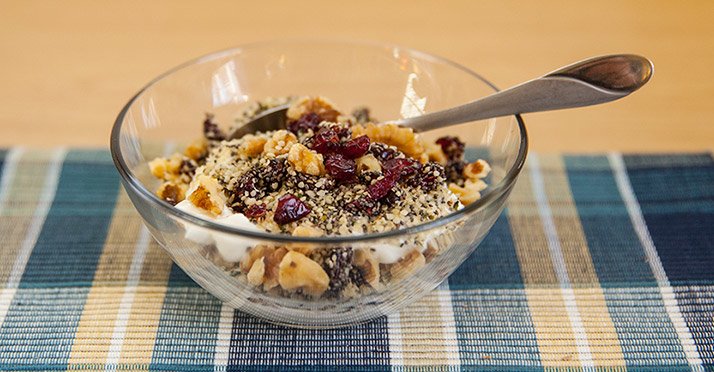
3. Sausage and egg sandwich with OJ
Nothing says homestyle goodness like the combination of eggs, sausage, and toast. Vegetarians don't have to miss out on this classic meal; a little creative adaptation is all it takes! In addition to being a protein powerhouse, this take on an open-faced breakfast sandwich of vegan sausage, eggs, and toast provides 26 milligrams of iron—a hefty percentage of the 30 milligrams recommended for women, and almost twice the 14 milligrams suggested for men.
Why so much? Iron is an essential mineral in the transport and delivery of oxygen to the muscles. And while vegetarian diets generally contain as much iron as omnivore diets, there is a drastic difference in bioavailability, or how much iron you can absorb. Plant foods contain nonheme iron, which is absorbed less favorably by the body compared to the heme iron found in animal products. In a 1995 dietary assessment of vegetarians and nonvegetarians who consumed the same amount of iron, iron stores in vegetarians were found to be reduced, suggesting that non-heme iron absorption is compromised by other factors in the diet, including fiber and phytate, a form of phosphorus found in high levels in soy products.6
So how you combat this problem? With meals like this! Next time you're munching on some vegan breakfast patties, take a sip of OJ. Vitamin C, which can be easily found in fruits and vegetables, can help counteract the effects of iron inhibitors and increase the absorption rate of iron.
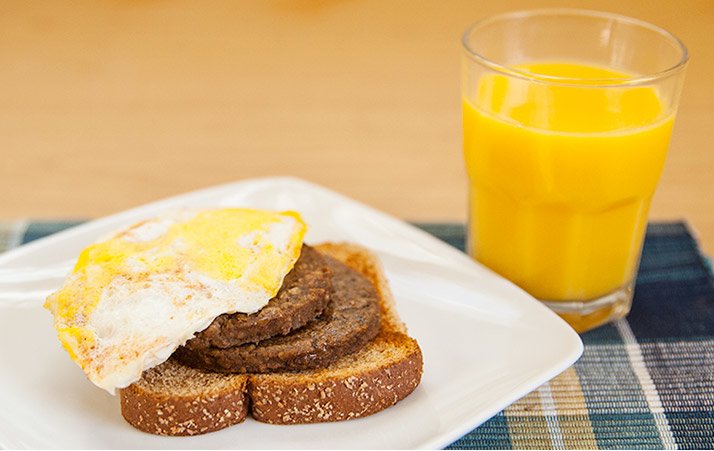
4. Fried-Egg-Topped Veggie Burger with Iced Coffee
Move over, Egg McMuffin. Choose this healthier option and have a transportable breakfast perfect for on-the-go morning meals. It's also a great source of B-12, containing 1.5 micrograms of the recommended daily dosage of 2.4 micrograms.
Vitamin B-12 is important for metabolism, the formation of red blood cells, and the maintenance of the central nervous system. Low levels of B-12, on the other hand, can cause anemia, numbness, and painful tingling in the arms and legs. Unfortunately, plant-based foods are generally not a great source of this integral vitamin. But there's no need to worry! Vitamin B-12 is highly bioavailable, so look for food products fortified with B-12 such as soy milk and soy-based burgers, both of which you'll get in this meal.
Looking for additional supplementation? You're in luck. Vitamin B-12 supplements aren't made from animal-based products and are suitable for a vegetarian diet. Just be sure to seek out a supp that delivers a dose of around 250 micrograms to compensate for the low absorption rate.7
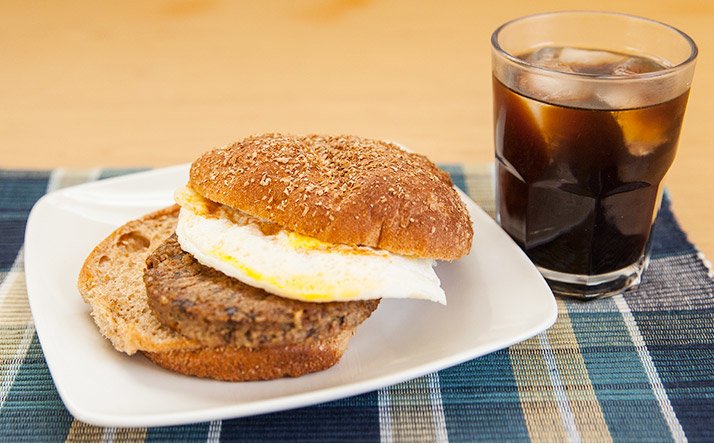
5. Yogurt Parfait with Wheat Germ and Berries
Zinc, an essential micronutrient, is a component of over 100 enzymes responsible for protein synthesis, immune function, blood formation, and too many other important bodily processes to list here.8 The bioavailability of zinc from vegetarian diets is typically lower than nonvegetarian diets. What's more, eating a lot of legumes and whole grains can actually inhibit zinc absorption. As a result, vegetarians may require up to 50 percent above the recommended daily value of this crucial mineral.9,10
All those weights lifted and miles logged can increase zinc loss, putting vegetarian athletes at even higher risk for zinc deficiency. This meal can help! Add some wheat germ and fruit to your protein-rich yogurt, and you've got a meal that hits the spot—not to mention one that contains 3.9 milligrams of the 15 milligrams of zinc needed for men and 13 milligrams needed for women.
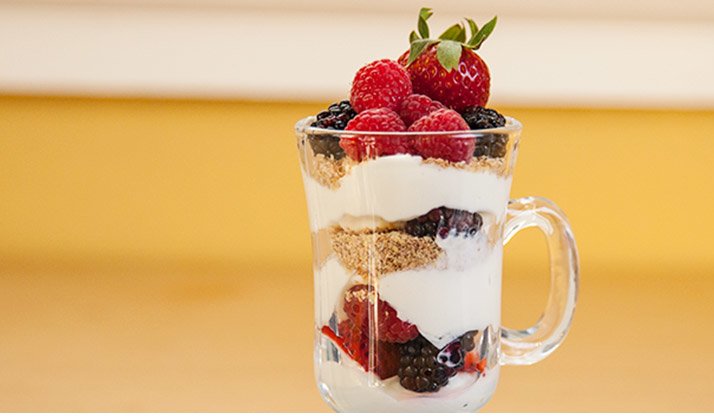
6. Kale and Tofu Omelet
Even if you drink milk and top off your veggie burger with a fried egg and melted cheese, studies show that vegetarian diets still tend to fall short on calcium, which is known for its bone-building properties, among other important functions.11 Coupled with lower intakes of vitamin D, vitamin B-12, protein, and omega-3s—all of which have important roles in maintaining bone health—vegetarians are statistically at greater risk for low bone mineral density and fractures.
To help meet the recommended intake for calcium, consider adding calcium-fortified soy and cereals, as well as calcium-rich milk, yogurt, and green vegetables like broccoli, bok choy, and kale. This omelet contains tofu, which has 16 grams of calcium per quarter block. While it's great on its own, it packs even more of a punch when added to a scramble and paired with an antioxidant-packed superstar like kale. The dish as a whole contains 635 milligrams of calcium, a decent start to chip away at your recommended 1,000-milligram daily intake.
If you'd like to finish off your RDA with a calcium supplement, look for one that contains 250-300 milligrams per serving.
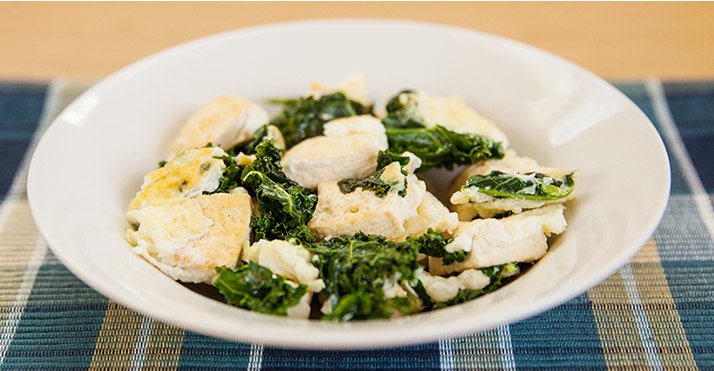
7. Cornflakes with Strawberries
Who doesn't love to start the day—or, heck, end the day—with a bowl of cereal? Well, it turns out you can have your corn flakes and get your vitamins, too.
This bowl of goodness contains 181 IU of vitamin D, about 20 percent of the recommended daily value. Following calcium, vitamin D is the next most important micronutrient for bone health. Vitamin D is obtained in the diet primarily as cholecalciferol (vitamin D-3) from animal sources such as fatty fish, egg yolks, and fortified milk, and to a much lesser extent as ergocalciferol (vitamin D-2) from plant sources. Most vegetarian diets contain very little vitamin D, which puts them at a higher risk for developing low bone mineral density and leading to possible bone fractures.12
Many soy products, as well as orange juice and breakfast cereals, are often fortified with vitamin D. But don't forget that the best source always has been, and always will be, a few more minutes per day in the sunshine!
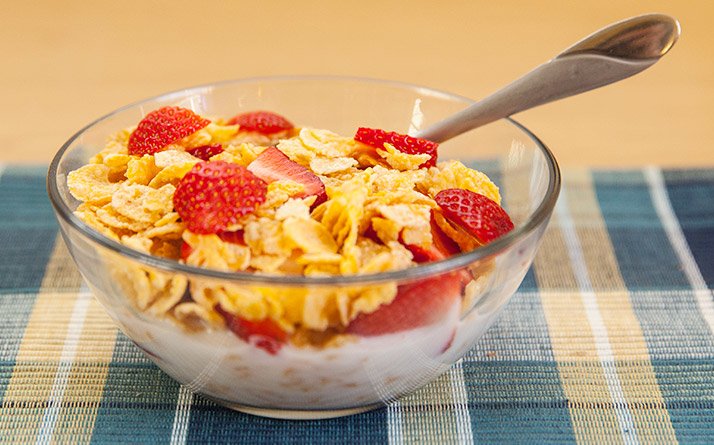
References
- Institute of Medicine (US). Panel on Micronutrients. (2005). Dietary Reference Intakes for Energy, Carbohydrate, Fiber, Fat, Fatty Acids, Cholesterol, Protein and Amino Acids. Panel on Macronutrients Panel on the Definition of Dietary Fiber, Subcommittee on Upper Reference Levels of Nutrients, Subcommittee on Interpretation and Uses of Dietary Reference Intakes, and the Standing Committee on the Scientific Evaluation of Dietary Reference Intakes, Food and Nutrition Board. National Academies Press.
- Rodriguez, N. R., DiMarco, N. M., & Langley, S. (2009). Position of the American dietetic association, dietitians of Canada, and the American college of sports medicine: nutrition and athletic performance. Journal of the American Dietetic Association, 109(3), 509-527.
- Sanders, T. A. (2009). DHA status of vegetarians. Prostaglandins, Leukotrienes and Essential Fatty Acids, 81(2), 137-141.
- Geppert, J., Kraft, V., Demmelmair, H., & Koletzko, B. (2005). Docosahexaenoic acid supplementation in vegetarians effectively increases omega-3 index: a randomized trial. Lipids, 40(8), 807-814.
- Adarme-Vega, T. C., Lim, D. K., Timmins, M., Vernen, F., Li, Y., & Schenk, P. M. (2012). Microalgal biofactories: a promising approach towards sustainable omega-3 fatty acid production. Microbial Cell Factories, 11(1), 96.
- Shaw, N. S., CHIN, C. J., & PANf, W. H. (1995). A Vegetarian Diet Rich in Soybean Products Compromises Iron Status in Young Students. Journal of Nutrition, 125(2): 212-9.
- Herbert, V. (1988). Vitamin B-12: plant sources, requirements, and assay. The American Journal of Clinical Nutrition, 48(3), 852-858.
- Hunt, J. R. (2003). Bioavailability of iron, zinc, and other trace minerals from vegetarian diets. The American Journal of Clinical Nutrition, 78(3), 633S-639S.
- Harland, B. F., & Oberleas, D. (1986). Phytate in foods. World Review of Nutrition and dietetics, 52, 235-259.
- Food and Drug Administration. (2001). Dietary reference intakes for vitamin A, vitamin K, arsenic, boron, chromium, copper, iodine, iron, manganese, molybdenum, nickel, silicon, vanadium, and zinc. Report of the Panel on Micronutrients.
- Venderley, A. M., & Campbell, W. W. (2006). Vegetarian diets. Sports Medicine, 36(4), 293-305.
- Tucker, K. L. (2014). Vegetarian diets and bone status. The American Journal of Clinical Nutrition, 100(Supplement 1), 329S-335S.
